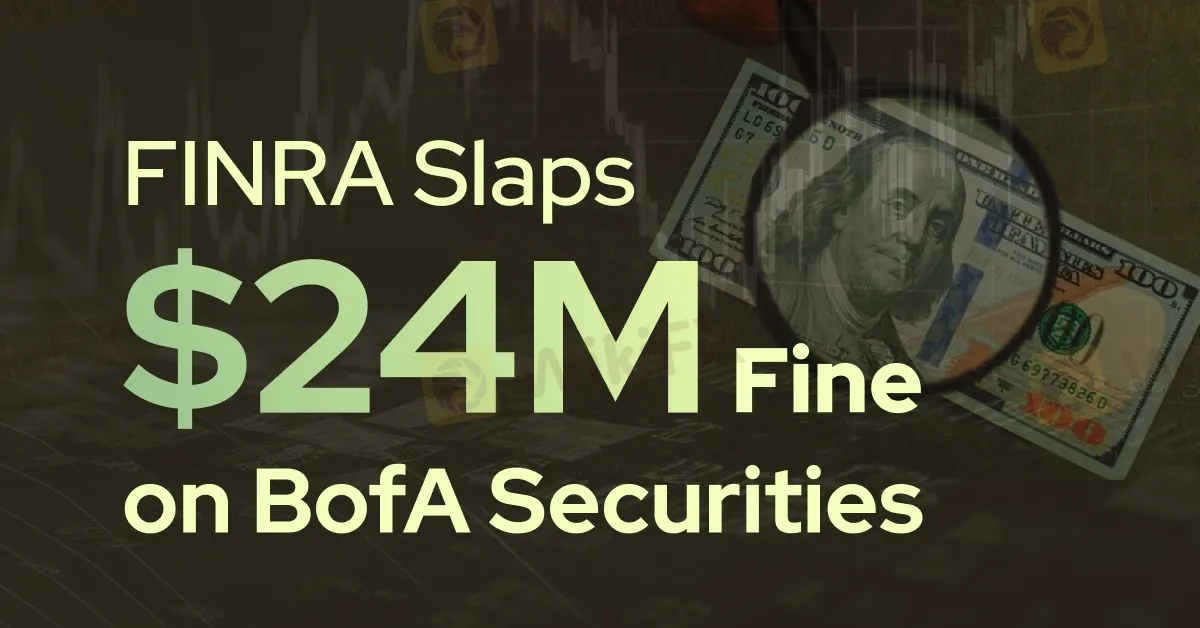简体中文
繁體中文
English
Pусский
日本語
ภาษาไทย
Tiếng Việt
Bahasa Indonesia
Español
हिन्दी
Filippiiniläinen
Français
Deutsch
Português
Türkçe
한국어
العربية
FINRA Slaps $24M Fine on BofA Securities
Abstract:FINRA levies $24 million fine against BofA Securities for alleged spoofing and supervisory failures, unveiling ongoing regulatory scrutiny across financial markets.

The Financial Industry Regulatory Authority (FINRA) has taken action against BofA Securities, imposing a significant fine of $24 million. This penalty comes as a result of the firm's alleged involvement in more than 700 instances of spoofing and associated supervisory shortcomings within the US Treasury secondary markets, spanning over a six-year period.
Spoofing, a practice involving deceptive orders to fabricate market activity, was reportedly employed by BofA Securities through two former traders in the US Treasury secondary markets from October 2014 to February 2021. The firm stands accused of engaging in 717 instances of spoofing during this time.
The Executive Vice President and Head of Enforcement at FINRA, Bill St. Louis, expressed concern, highlighting that spoofing undermines market transparency and integrity by distorting actual supply and demand. He emphasized that this action underscores FINRA's commitment to vigorously pursue firms involved in spoofing, including cross-product spoofing.
Throughout this duration, BofA Securities failed to establish and sustain a supervisory system capable of detecting spoofing activities in the US Treasury markets. Although a system was implemented by the company in November 2015, it remained inadequate until mid-2019, primarily detecting algorithmic spoofing and not manual manipulation by traders.

While BofA Securities has accepted FINRA's findings without admitting or denying the charges, it's worth noting that the company was previously fined $325,000 last year by FINRA for allegedly issuing inaccurate monthly reports for order execution.
The regulatory body disclosed that between January 2014 and February 2022, BofA Securities incorrectly reported order execution statistics for its two market centres, MLCO and MLIX. The company reportedly disregarded the requirement to present separate statistical information under Rule 605, leading to combined reports for both centres being published.
In a separate incident, Credit Suisse faced scrutiny when FINRA fined its US subsidiary $900,000 for deficiencies in regulatory reporting. The violations involved tardy trades and inaccurate reports from November 2015 to March 2023 on the Trade Reporting and Compliance Engine.
Earlier this year, Webull was subject to a $3 million penalty by FINRA. The focus was on the firm's oversight in onboarding options traders and the absence of adequate supervisory systems to identify and address customer complaints. This oversight led to the approval of roughly 9,000 unqualified traders, including more than 2,500 customers under 21 without the required options trading experience.

Disclaimer:
The views in this article only represent the author's personal views, and do not constitute investment advice on this platform. This platform does not guarantee the accuracy, completeness and timeliness of the information in the article, and will not be liable for any loss caused by the use of or reliance on the information in the article.
Read more

Navigating the Intersection of Forex Markets, AI Technology, and Fintech
The financial world is transforming, driven by the rapid integration of artificial intelligence (AI) and innovative fintech solutions. This change is most apparent in forex markets, where algorithmic trading and deep learning are redefining strategies, risk management, and decision-making. In this article, we explore how AI-driven technologies are not only revolutionizing forex trading but are also propelling fintech innovations that enhance customer experiences, bolster security, and unlock new market opportunities.

The One Fear That’s Costing You More Than Just Profits
The fear of missing out (FOMO) is NOT what you think it is! Read the three lesser-discussed components that contribute greatly to FOMO trading!

Bitpanda Secures Full Broker-Dealer License in Dubai
Bitpanda has officially obtained a full broker-dealer license from the Dubai Virtual Assets Regulatory Authority (VARA), marking a significant milestone in its international expansion. This approval, which follows preliminary authorization granted three months earlier, enables the European digital asset exchange to introduce its comprehensive suite of virtual asset services to investors in the United Arab Emirates (UAE).

Gold Surges to New Highs – Is It Time to Buy?
Recently, gold prices have once again set new records, surpassing $3,077 per ounce and continuing a four-week winning streak. Is It the Right Time to Invest?
WikiFX Broker
Latest News
Why Are Financial Firms Adopting Stablecoins to Enhance Services and Stability?
Experienced Forex Traders Usually Do This Before Making a Lot of Money
Octa vs XM:Face-Off: A Detailed Comparison
When High Returns Go Wrong: How a Finance Manager Lost RM364,000
Bridging Trust, Exploring Best—WikiEXPO Hong Kong 2025 Wraps Up Spectacularly
Interactive Brokers Expands Crypto Trading with Solana, XRP, Cardano, and Dogecoin
Fidelity Investments Explores Stablecoin Innovation in Digital Assets Sector
Why More People Are Trading Online Today?
SEC Ends Crypto.com Probe, No Action Taken by Regulator
Broker Comparison: FXTM vs XM
Currency Calculator







